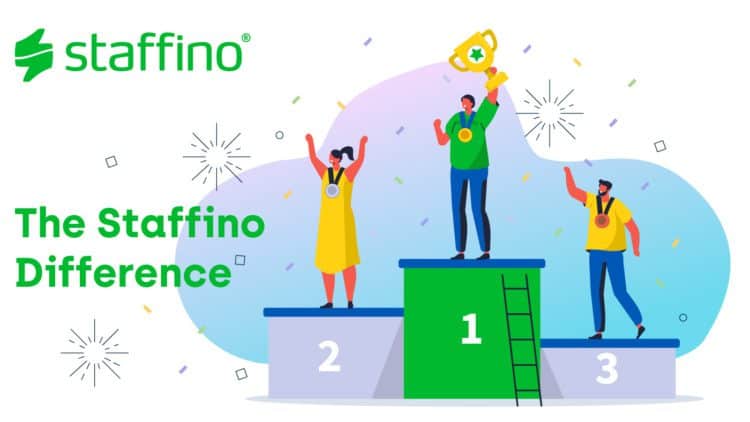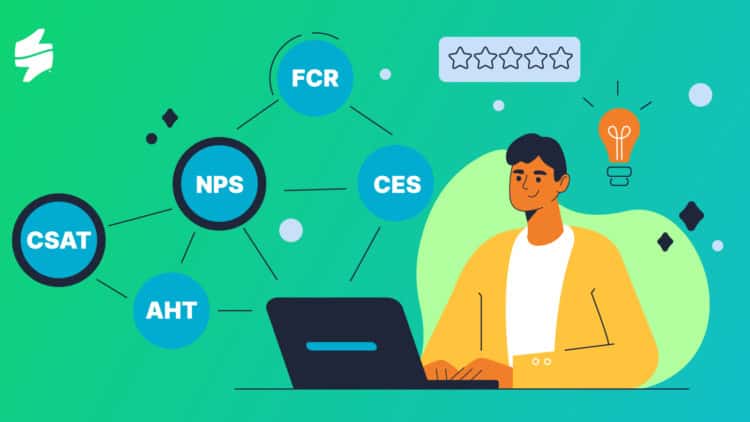IVR and Staffino email/SMS post call surveys may seem comparable with their easiness of execution and low cost. However, there are some significant differences that you should know about. Especially when it comes to conversion rates and most importantly utilizing collected data, which is ultimately the main purpose of a customer survey.
IVR surveys seem to be convenient because they are easy to set up. Also, unlike with email and SMS surveys, you don’t need the customer’s email or even phone number. If your company doesn’t collect any customer data, IVR surveys may seem like the right choice at first. However, some of the benefits that managers are missing when using IVR surveys may have you rethinking if collecting customer contact information doesn’t pay off after all.
1. Higher volume of qualitative feedback
Qualitative and text information, which are key components of interaction feedback, are reportedly only in ~20% of all responses gathered by IVR. To compare to Staffino’s standard feedback, text within negative feedback is always mandatory. Surprisingly, even though text within positive feedback is optional, 84% of customers on average choose to write a comment.
2. Strong ability to use Qualitative Information
Why is qualitative feedback so important? In simple terms, different customer metrics like CSAT, CES and FCR are great to track progress over time and to detect which areas are doing well or need improvement. But they won’t tell you “why” those areas are performing well or poorly, and managers can basically only assume and guess. That’s why qualitative feedback comes so useful. It reveals the why behind the numbers and provides a solid ground for managers to take data-backed actions. Using IVR surveys makes it difficult to utilize qualitative feedback, as it needs to be transcribed by a human (labour intensive/human error) or software (not 100% precise).
3. Having the ability to initiate Service Recovery
The last thing you want is to lose customers for good after they had a negative experience with your company just because you didn’t reach out to them. According to The Temkin Group’s 2016 Customer Experience Rating study, “it takes 12 positive experiences to make up for one, unresolved negative experience.” Time is of the essence here. IVR usually doesn’t have any system in place to notify you about retention cases (customers about to leave you) and doesn’t provide you with a platform to start service recovery immediately. Staffino users report they’re able to start service recovery almost immediately, as feedback is posted in real time, with a success rate around 70%.
4. Capturing multiple channels
The chances are your company uses more channels than just the telephone when communicating with customers. Instead of implementing different solutions for each one of them, you may want to consider using one complex platform. That can handle all of your channels and yet make it personalized and easy to navigate for different levels of managers and executives. For example, one of Staffino’s users employs Staffino transaction surveys for telephone, email, social media, and even letters. This way, they are able to compare and manage all their channels effectively and efficiently.
5. Positive impact on agents
Praise and kind words are one of the most effective agent motivators. With IVR surveys, you are simply missing on this valuable aspect of customer feedback that will not only make your agents feel happier, but also will help increase their performance and reduce employee turnover.
6. Convenience for your customers
Some customers will often find IVR surveys annoying and even invasive. Not everyone can stay on the phone for additional time right after talking to one of your agents. So even if the customer wants to leave some feedback, unless they do it right after talking to your agent, they lose their chance as most of the time they can’t go back to the IVR survey later when it’s more convenient for them.
With Staffino surveys, it is the customer who is in charge. They can fill out the survey on their own terms from any device, which is much more convenient, and it definitely reflects in conversion rates.
7. Conversion rates
The sooner the customer gets a survey after an interaction with your company, the higher your conversion rate will be. Naturally, you’d think IVR therefore must have the highest conversion rates. Surprisingly, that’s not the case. Based on our clients’ experience, IVR has below average conversion rates (0.6-0.8%) compared to Staffino email surveys (8-12%). This points back to customers convenience of being able to fill out the survey on their own terms and also a growing number of customers who prefer to take care of everything online in today’s digital world.
8. The real cost comparison
The overall cost with most email/SMS feedback solutions is pretty straightforward. If you are considering IVR surveys, the cost seems to be low initially, but you will want to remember to also account for additional costs to transcribe, analyze and interpret data, which can be very labour intensive. These features are a lot of times fully or partially already included in complex feedback solutions like Staffino.
Conclusion
IVR surveys can provide an easy introduction of customer feedback to companies with no customer contact information. Every decision maker to consider if the missed benefits don’t outweigh the cost.
Some of the benefits of Staffino email feedback we mentioned are volume and utilization of Qualitative feedback, Service recovery, multiple channels, agent motivation, customers convenience and conversion rates.
Managers should always make sure to compare the overall cost to the company instead of the initial cost to start using a solution as some may not include all the necessary tools nor cover all the stages from data collection to its interpretation.









